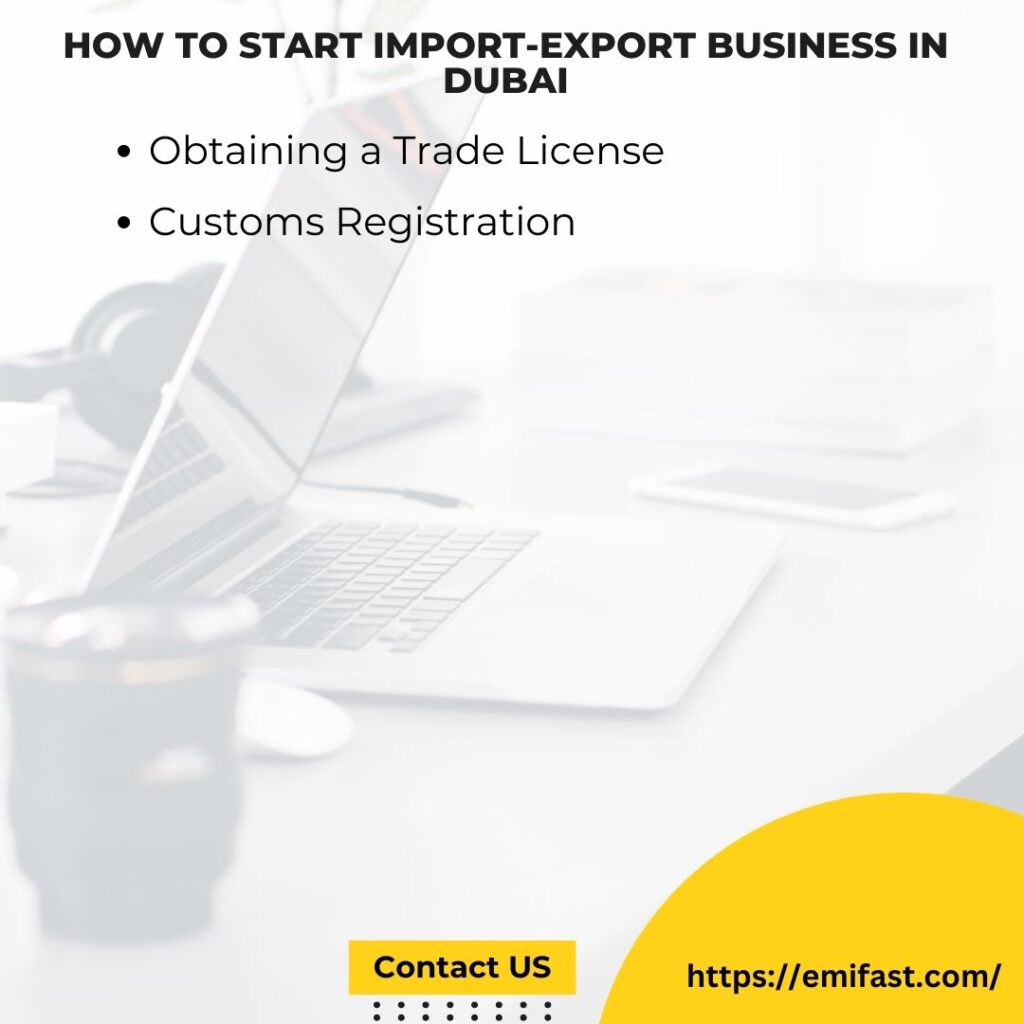How to Get an Import-Export License in Dubai: A Step-by-Step Guide
October 3, 2024
The UAE has become one of the world’s most critical trading corridors connecting Europe and East Asia. Its strategic geographic position makes it a powerhouse in global import, export, and re-export activities. For entrepreneurs looking to tap into this multi-billion-dollar trade ecosystem, getting an import export license Dubai represents the gateway to enormous opportunities.
Understanding how to get import export license UAE requirements can seem overwhelming, but the process becomes manageable when broken down into clear steps. This comprehensive guide walks through everything needed to secure proper licensing and start trading operations.
Key Takeaways
- Dubai serves as a crucial global trade hub connecting Europe and East Asia
- Free zones provide significant tax advantages for trading businesses
- Import export license Dubai costs start around AED 16,575
- Proper licensing requires both trade license acquisition and customs registration
Understanding Dubai’s Import-Export Ecosystem
Dubai’s import business involves bringing goods from anywhere in the world into the UAE market. The emirate’s multicultural population creates constant demand for diverse, quality products, generating substantial business opportunities for traders who understand market dynamics.
Export operations focus on shipping products—whether locally manufactured or re-exported—to international markets through Dubai’s extensive free trade zones. This dual approach enables businesses to serve both domestic and international markets efficiently.
Major Products in Dubai’s Trading Economy:
- Crude oil and refined petroleum products
- Precious metals including diamonds and gold jewelry
- Automotive and transportation equipment
- Broadcasting and telecommunications equipment
- Electronics and consumer goods
- Textiles and luxury items
These sectors represent proven markets with established supply chains and customer bases, making them attractive for new trading enterprises.
How to Get Import Export License UAE: The Complete Process
Obtaining proper licensing involves two distinct but interconnected stages. Understanding both stages helps businesses plan resources and timelines effectively.
Stage 1: Dubai Trade License for Import Export
Step 1: Business Name Reservation Reserve your trade name by selecting from three shortlisted options. Choose names that reflect your business focus and work well across different languages common in Dubai’s international business environment.
Step 2: Activity Selection Select specific business activities relevant to your trading operations. This decision affects licensing requirements, office space needs, and operational permissions.
Step 3: Ownership Structure Decision Choose between local sponsorship arrangements or 100% foreign ownership options available in certain jurisdictions. Each structure offers different advantages depending on business goals and market focus.
Step 4: Physical Infrastructure Arrange appropriate office space and warehouse facilities, then finalize rental agreements. Location choice significantly impacts operational costs and logistics efficiency.
Step 5: Legal Documentation Prepare the Memorandum of Association (MOA) outlining company structure and authorized activities. This document serves as the legal foundation for all business operations.
Step 6: Government Approvals Submit required documentation to Dubai Economy for official approval. Processing times vary based on business complexity and documentation completeness.
Step 7: Financial Obligations Complete necessary fee payments and obtain your business license. Budget for both initial costs and ongoing renewal requirements.
Step 8: Operational Setup Apply for investor visas and establish corporate banking relationships. These steps enable actual business operations and financial transactions.
Stage 2: Customs Registration for Trading Operations
Chamber of Commerce Registration Register with Dubai Chamber of Commerce to access business support services and networking opportunities essential for trading success.
Customs Authorization Register with Dubai Customs to obtain your Import-Export Code. This authorization enables legal clearing of goods through UAE customs systems.
Operational Commencement Begin importing and exporting goods globally from Dubai using established systems and procedures.
Import Export Business Setup Dubai: Detailed Procedures
Export License Requirements and Process

Businesses planning to export locally produced or manufactured goods need specific export authorizations. The process varies depending on product categories and destination markets.
Essential Documentation:
- Valid Export Declaration Certificate from licensing authorities
- Instructions of Declaration of Goods (IDG) application when applicable
- Special permits for restricted or prohibited goods categories
- Detailed sales invoices specifying item descriptions, quantities, and values
Processing Steps:
- Submit complete documentation packages to customs offices
- Pay required declaration registration fees
- Receive Customs Declaration Certificate authorizing export activities
Free zone operations often provide streamlined export procedures with additional tax advantages, making them attractive for export-focused businesses.
Import License Requirements and Process
Import operations require careful attention to regulatory compliance and documentation accuracy. Dubai Customs maintains strict oversight of import activities to ensure legal compliance.
Critical Documentation:
- Import permits with special authorization for restricted goods
- Comprehensive invoices detailing quantities and values of imported products
- Certificates of Origin approved by relevant Chambers of Commerce
- Documentation specifying weights, packaging details, and HS codes for all items
Operational Procedures:
- Submit Bills of Lading through appropriate channels
- Coordinate with shipping agents for delivery orders (typically issued 3-4 days before vessel arrival)
- Complete cargo clearance before specified deadlines
- Submit Import Declaration forms online with required payments
- Receive Customs Import Declaration Certificate after payment confirmation
- Coordinate transportation for cleared cargo
- Comply with additional inspection requirements when applicable
Dubai Customs may review documentation at any point, making accuracy and completeness essential for smooth operations.
Cost Analysis for Import Export License Dubai
Understanding the complete cost structure helps businesses budget appropriately for licensing and ongoing operations.
Base Licensing Costs: Starting costs for import export license Dubai begin around AED 16,575, though final amounts vary based on specific business activities and chosen operational structures.
Additional Cost Considerations:
- Trade license fees varying by activity type and jurisdiction
- Office space rental deposits and ongoing lease costs
- Warehouse facility expenses for inventory storage
- Professional service fees for documentation and compliance
- Banking relationship establishment costs
- Employee visa processing fees
- Insurance requirements for business operations
Ongoing Operational Expenses:
- Annual license renewal fees
- Customs declaration charges per shipment
- Professional services for compliance management
- Transportation and logistics costs
- Currency exchange fees for international transactions
Free zone operations may incur higher initial setup costs but often provide tax advantages that offset these expenses over time.
Regulatory Compliance and Documentation Management
Dubai’s import-export regulations require meticulous attention to documentation and compliance procedures. The Mirsal 2 system streamlines many processes, but businesses must understand requirements thoroughly.
Restricted and Prohibited Items: Certain goods cannot be imported or exported without special permits. Understanding these restrictions prevents costly delays and legal complications.
Documentation Standards: All documentation must meet Dubai Customs standards for accuracy, completeness, and authenticity. Errors in documentation can result in shipment delays, additional fees, or rejection.
Ongoing Compliance Requirements: Businesses must maintain accurate records, submit required reports, and comply with changing regulations to maintain their operating licenses.
Strategic Considerations for Trading Success
Market Research: Understanding target markets, supplier capabilities, and competitive landscapes helps businesses make informed decisions about product selection and pricing strategies.
Supply Chain Development: Building reliable supplier relationships and efficient logistics networks creates competitive advantages in Dubai’s fast-moving trading environment.
Financial Management: Proper cash flow management, currency hedging strategies, and banking relationships support sustainable trading operations.
Technology Integration: Modern trading businesses benefit from technology solutions that streamline operations, improve compliance, and enhance customer service.
Why Professional Guidance Matters
The complexity of import export business setup Dubai often requires professional expertise to navigate successfully. Experienced consultants understand regulatory requirements, documentation standards, and operational best practices that help businesses avoid common pitfalls.
Professional services can accelerate the licensing process, ensure compliance with all requirements, and provide ongoing support for operational challenges. While these services involve additional costs, they often prevent more expensive mistakes and delays.
Conclusion: Your Gateway to Global Trade
Dubai’s position as a global trading hub creates exceptional opportunities for businesses that understand how to access and leverage the market effectively. Getting an import export license Dubai opens doors to international trade networks, favorable tax structures, and world-class business infrastructure.
Success requires understanding both the licensing process and the broader business environment. Companies that invest time in proper planning, documentation, and compliance create foundations for long-term trading success in one of the world’s most dynamic commercial environments.
The investment in proper licensing and professional guidance pays dividends through smoother operations, regulatory compliance, and access to Dubai’s extensive trading networks that connect businesses to global markets.




